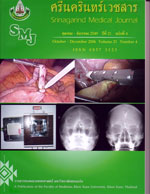Screening for Analgesic and Anti-inflammatory Activities of Extracts from Local Vegetables in Northeast Thailand
Abstract
Background: Northeast region of Thailand is one of the rich source of vegetables, the favorite Thai food in daily diet. There are very few pharmacological studies in folk vegetables.Objectives: This study described screening tests for the analgesic and anti-inflammatory activities of 10 local vegetables inhabitated in the Northeast region of Thailand.
Method: Analgesic activity was assessed by writhing test and tail flick test. Anti-inflammatory activity was assessed by rat hind paw edema model.
Results: The water extract of vegetables at 1 g/kg administered orally in Swiss albino male mice was used to test for analgesic activity in the acetic acid-induced writhing test model. The extracts from Coccinia grandis (L.) Voigt., Tiliacora triandra Diels., Barringtonia acutangula Gaerth., Brassica juncea (Linn.) Czern&Coss., Limnophila aromatica (Lomk) Merr., Piper samentosum Roxb. Ex. Hunter and Anethum graveolens Linn. elicited significant inhibition of writhing reflex by 35-64% (p<0.05) when compared with diclofenac (72% inhibition) The four most potent extracts were further tested for anti-inflammatory activity. However, none of them possessed any anti-inflammatory effect in carragenan-induced rat paw edema assay. Nevertheless, the extracts from Coccinia grandis (L.) Voigt. and Tiliacora triandra Diels. showed weak analgesic activity in tail flick test.
Conclusions: It was concluded that the Northeast Thailand local vegetables such as Coccinia grandis and Tiliacora triandra show some analgesic property and none has anti-inflammatory action.




